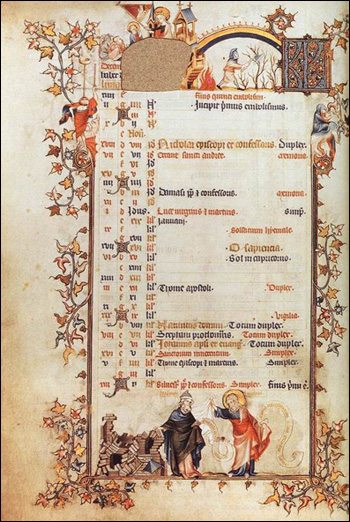1월은 영어로 January, 2월은 영어로 February, 3월은 영어로 March, 4월은 영어로 April, 5월은 영어로 May, 6월은 영어로 June, 7월은 영어로 July, 8월은 영어로 August, 9월은 영어로 September, 10월은 영어로 October, 11월은 영어로 November, 그리고 12월은 영어로 December입니다.

보기 쉽게 표로 정리해보면 아래와 같습니다. (5월, 6월, 7월은 보통 약자를 쓰지 않습니다.)
| 한글 | 영어 | 약자 | 일수 |
|---|---|---|---|
| 1월 | January | Jan. | 31 |
| 2월 | February | Feb. | 28/29 |
| 3월 | March | Mar. | 31 |
| 4월 | April | Apr. | 30 |
| 5월 | May | May | 31 |
| 6월 | June | June | 30 |
| 7월 | July | July | 31 |
| 8월 | August | Aug. | 31 |
| 9월 | September | Sept. | 30 |
| 10월 | October | Oct. | 31 |
| 11월 | November | Nov. | 30 |
| 12월 | December | Dec. | 31 |
각 달의 영어 명칭에 대해 예시와 함께 알아보겠습니다.
1월 (January)
1월은 영어로 January이고, 약자는 Jan.입니다. January는 로마의 문의 신 'Janus(야누스)'의 이름에서 유래되었습니다. 야누스는 두 얼굴을 가지고 있습니다. 그 중 하나는 과거를 보고, 하나는 미래를 보고 있습니다. 과거 로마 시대에는 야누스 신전의 문이 전쟁 중일 때는 열려있고, 평화가 유지될 때는 닫혀있었습니다. 지금도 선과 악이 공존하는 이중적인 사람들을 흔히 야누스에 빗대어 표현하기도 합니다.
예시 문장:
- I'm going on a trip to Hawaii in January. (1월에 하와이로 여행을 갈 예정입니다.)
- January is a time for new beginnings and resolutions. (1월은 새로운 시작과 다짐의 시기입니다.)
- January is the first month of the year. (1월은 한 해의 첫 번째 달이다.)
- We usually get heavy snow in January. (1월에는 보통 많은 눈이 내린다.)
- The sales report for January looks promising. (1월 판매 보고서는 유망해 보인다.)
- My birthday is in January. (내 생일은 1월이다.)
- They plan to visit Korea in January. (그들은 1월에 한국을 방문할 계획이다.)
- January is often the coldest month in many countries. (1월은 많은 나라에서 가장 추운 달이다.)
- January 1st is celebrated as New Year's Day. (1월 1일은 새해 첫날로 기념된다.)
- He started his new job in January. (그는 1월에 새 직장을 시작했다.)
2월 (February)
2월은 영어로 February이고, 약자는 Feb.입니다. February는 라틴어로 '정화, 깨끗이 함'이라는 뜻의 'februa'가 어원입니다. 옛 로마인들은 매년 2월에 몸과 마음을 정결히 하는 의식이자 축제인 'Februalia'를 가졌다고 합니다.
예시 문장:
- My sister's birthday is in February. (2월에 제 여동생의 생일이 있습니다.)
- February is usually a cold month in my country. (2월은 보통 저의 나라에서는 추운 달입니다.)
- February is the shortest month of the year. (2월은 한 해 중 가장 짧은 달이다.)
- Valentine's Day is celebrated on February 14th. (발렌타인 데이는 2월 14일이다.)
- They are planning a trip to Paris in February. (그들은 2월에 파리 여행을 계획 중이다.)
- February often has unpredictable weather. (2월의 날씨는 종종 예측하기가 어렵다.)
- We have a long weekend in February this year. (올해 2월에는 휴일이 낀 주말이 있다.)
- The Winter Olympics were held in February. (동계 올림픽은 2월에 열렸다.)
- February is known for its romantic atmosphere. (2월은 로맨틱한 분위기로 알려져 있다.)
- In leap years, February has 29 days. (윤년에는 2월이 29일이다.)

3월 (March)
3월은 영어로 March이고, 약자는 Mar.입니다. March는 로마의 전쟁신 'Mars'가 어원입니다. 전쟁의 신이 3월이 된 이유는 대개 겨울 동안 중단했던 전쟁을 봄(3월)에 재개했기 때문입니다.
예시 문장:
- We're planning a hiking trip in March. (3월에 하이킹 여행을 계획 중입니다.)
- March marks the arrival of spring. (3월은 봄의 시작을 알리는 달입니다.)
- March marks the beginning of spring in many places. (3월은 많은 곳에서 봄의 시작을 알린다.)
- The academic year often starts in March. (학년도는 보통 3월에 시작된다.)
- International Women's Day is celebrated on March 8th. (3월 8일은 세계 여성의 날이다.)
- Many flowers bloom beautifully in March. (3월에는 많은 꽃이 아름답게 핀다.)
- March is the perfect month for a picnic. (3월은 피크닉을 가기에 완벽한 달이다.)
- They moved into their new house in March. (그들은 3월에 새 집으로 이사했다.)
- March brings warmer temperatures after winter. (3월은 겨울 후에 따뜻한 기온을 가져온다.)
- There are often seasonal festivals in March. (3월에는 종종 계절 축제가 열린다.)
4월 (April)
4월은 영어로 April이고, 약자는 Apr.입니다. April은 꽃이 벌어지듯이 열린다는 뜻의 라틴어 'aperio'가 어원으로 식물이 자라기 시작하는 달이라는 의미를 가지고 있습니다.
예시 문장:
- I have an important exam in April. (4월에 중요한 시험이 있습니다.)
- April showers bring May flowers. (속담: 4월의 소나기가 5월의 꽃을 가져옵니다.)
- April is known for its frequent rain showers. (4월은 잦은 비로 유명하다.)
- Many people enjoy cherry blossoms in April. (많은 사람들이 4월에 벚꽃을 즐긴다.)
- April 1st is celebrated as April Fool's Day. (4월 1일은 만우절이다.)
- The weather becomes warmer in April. (4월에는 날씨가 더 따뜻해진다.)
- Many schools organize spring festivals in April. (많은 학교가 4월에 봄 축제를 개최한다.)
- April is the perfect month to start gardening. (4월은 정원 가꾸기를 시작하기에 완벽한 달이다.)
- Earth Day is observed on April 22nd. (4월 22일은 지구의 날이다.)
- In April, people prepare for the upcoming summer. (4월에는 사람들이 다가오는 여름을 준비한다.)
5월 (May)
5월은 영어로 May입니다. May는 성장의 여신 'Maia'에서 유래되었다고 합니다. 봄에 동물과 식물이 모두 성장한다는 점을 생각했을 때 납득이 갑니다.
예시 문장:
- My parents' anniversary is in May. (5월에 부모님의 결혼기념일이 있습니다.)
- May is a beautiful month with blooming flowers. (5월은 꽃이 피어나 아름다운 달입니다.)
- May is often considered the most pleasant month of the year. (5월은 종종 가장 쾌적한 달로 여겨진다.)
- Mother's Day is celebrated in May in many countries. (많은 나라에서 어머니의 날은 5월에 기념한다.)
- May is the month of fresh greenery and blooming flowers. (5월은 신선한 녹음과 꽃이 만발하는 달이다.)
- The weather in May is perfect for hiking. (5월의 날씨는 하이킹에 완벽하다.)
- May Day is celebrated on May 1st in many countries. (5월 1일은 많은 나라에서 근로자의 날로 기념된다.)
- Students often have field trips in May. (학생들은 보통 5월에 현장 학습을 간다.)
- The days become noticeably longer in May. (5월에는 낮 시간이 눈에 띄게 길어진다.)
- May is a popular month for weddings. (많은 사람들이 5월에 결혼식을 올린다.)

6월 (June)
6월은 영어로 June입니다. June은 결혼과 출산을 관장하는 로마의 여신 'Juno(주노)'가 어원입니다. 주노는 신의 우두머리인 'Jupiter(주피터)'의 부인이었습니다.
예시 문장:
- I'll be attending a wedding in June. (6월에 결혼식에 참석할 예정입니다.)
- June is the start of summer vacation for students. (6월은 학생들에게 여름 방학의 시작입니다.)
- June marks the beginning of summer in many countries. (6월은 많은 나라에서 여름의 시작을 알린다.)
- Schools usually have exams in June. (학교들은 보통 6월에 시험을 본다.)
- June is a popular month for outdoor festivals. (6월은 야외 축제가 많은 달이다.)
- Many people start planning summer vacations in June. (많은 사람들이 6월에 여름 휴가를 계획하기 시작한다.)
- June 21st is the summer solstice in the northern hemisphere. (6월 21일은 북반구의 하지이다.)
- In June, we enjoy longer daylight hours. (6월에는 더 긴 낮 시간을 즐길 수 있다.)
- They moved to a new city in June. (그들은 6월에 새로운 도시로 이사했다.)
- June is the perfect month for beach outings. (6월은 해변 나들이에 완벽한 달이다.)
7월 (July)
7월은 영어로 July입니다. July는 로마의 지도자 Julius Caesar(율리우스 카이사르, 줄리어스 시저라고도 불림)가 죽은 후 그를 기리기 위해 명명된 이름입니다. 카이사르는 1년을 365일로 정하고, 4년마다 윤년을 두는 율리우스력을 제정하였는데, 이는 오늘날 우리가 사용하는 그레고리오력의 전신입니다.
예시 문장:
- We're planning a beach trip in July. (7월에 해변 여행을 계획 중입니다.)
- July is the hottest month of the year in my country. (7월은 저의 나라에서 가장 더운 달입니다.)
- July is one of the hottest months of the year. (7월은 일 년 중 가장 더운 달 중 하나이다.)
- Independence Day is celebrated on July 4th in the US. (미국에서는 7월 4일이 독립기념일이다.)
- July is a great time for water sports. (7월은 수상 스포츠를 즐기기에 좋은 시기다.)
- They went camping in the mountains in July. (그들은 7월에 산으로 캠핑을 갔다.)
- Many families enjoy road trips in July. (많은 가족들이 7월에 자동차 여행을 즐긴다.)
- The monsoon season often begins in July in some regions. (일부 지역에서는 7월에 장마가 시작된다.)
- July is peak season for tourism in many places. (7월은 많은 지역에서 관광의 성수기다.)
- They attended a music festival in July. (그들은 7월에 음악 축제에 참석했다.)
8월 (August)
8월은 영어로 August이고, 약자는 Aug.입니다. 로마 최초의 황제이자 율리우스 카이사르의 후계자인 아우구스투스를 기리기 위해 명명된 이름입니다. 아우구스투스는 '덕망 있는, 고귀한, 장엄한'을 뜻하는 라틴어 'augustus'에서 유래했습니다.
예시 문장:
- I'll be celebrating my birthday in August. (8월에 제 생일을 축하할 예정입니다.)
- August is a popular month for family vacations. (8월은 가족 여행을 많이 하는 달입니다.)
- August is usually the peak of summer. (8월은 보통 여름의 절정이다.)
- Many people take vacations in August. (많은 사람들이 8월에 휴가를 간다.)
- The hottest days of the year often occur in August. (연중 가장 더운 날들은 종종 8월에 온다.)
- August is a great time to relax by the beach. (8월은 해변에서 휴식을 취하기 좋은 시기다.)
- In some countries, school holidays end in late August. (일부 나라에서는 8월 말에 방학이 끝난다.)
- They organized a family reunion in August. (그들은 8월에 가족 모임을 열었다.)
- Many cities host summer festivals in August. (많은 도시들이 8월에 여름 축제를 개최한다.)
- August nights are perfect for stargazing. (8월 밤은 별을 관찰하기에 완벽하다.)
9월 (September)
9월은 영어로 September이고, 약자는 Sept.입니다. September는 7을 의미하는 라틴어 'septem'에서 유래했습니다. 로마력으로는 March가 첫번째 달이기 때문입니다. BC 7세기에 1월과 2월이 추가됨으로써 두 달씩 밀려나 9번째 달이 되었습니다.
예시 문장:
- September is the start of the new school year. (9월은 새 학년의 시작입니다.)
- I'm looking forward to the September harvest festival. (9월의 수확 축제를 기대하고 있습니다.)
- September marks the beginning of autumn in many places. (9월은 많은 지역에서 가을의 시작을 알린다.)
- Students return to school in September. (학생들은 9월에 학교로 돌아간다.)
- September is a good time for hiking in the mountains. (9월은 산에서 하이킹하기 좋은 시기다.)
- The weather becomes cooler in September. (9월에는 날씨가 선선해진다.)
- They planted fall flowers in their garden in September. (그들은 9월에 정원에 가을 꽃을 심었다.)
- September is the harvest season for many crops. (9월은 많은 작물의 수확 시기다.)
- They held a community event in September. (그들은 9월에 지역 행사를 열었다.)
- September is known for its clear skies and mild weather. (9월은 맑은 하늘과 온화한 날씨로 유명하다.)

10월 (October)
10월은 영어로 October이고, 약자는 Oct.입니다. 숫자 8을 의미하는 'octo'에서 유래한 October는 로마력에서는 8번째 달이었습니다.
예시 문장:
- We'll be carving pumpkins for Halloween in October. (10월에 할로윈을 위해 호박을 조각할 예정입니다.)
- October is a beautiful month with colorful autumn leaves. (10월은 화려한 가을 단풍이 있는 아름다운 달입니다.)
- October is famous for its colorful autumn foliage. (10월은 형형색색의 가을 단풍으로 유명하다.)
- Halloween is celebrated on October 31st. (10월 31일은 할로윈을 기념하는 날이다.)
- October is the perfect month for outdoor activities. (10월은 야외 활동을 하기 완벽한 달이다.)
- Many people visit national parks in October. (많은 사람들이 10월에 국립공원을 방문한다.)
- The mornings become chilly in October. (10월에는 아침이 쌀쌀해진다.)
- October is a popular month for pumpkin festivals. (10월은 호박 축제로 인기 있는 달이다.)
- They started a new project at work in October. (그들은 10월에 직장에서 새로운 프로젝트를 시작했다.)
- October is a good time to prepare for winter. (10월은 겨울 준비를 하기 좋은 시기다.)
11월 (November)
11월은 영어로 November이고, 약자는 Nov.입니다. November는 라틴어로 숫자 9를 뜻하는 'novem'에서 유래되었는데, 이는 11월이 초기 로마 달력의 아홉번째 달이었기 때문입니다.
예시 문장:
- I'll be visiting my grandparents for Thanksgiving in November. (11월에 감사절을 맞아 할아버지, 할머니를 방문할 예정입니다.)
- November is a time for gratitude and reflection. (11월은 감사와 반성의 시기입니다.)
- November is the start of the holiday season. (11월은 휴가철의 시작이다.)
- Thanksgiving is celebrated in November in the US. (미국에서는 11월에 추수감사절을 기념한다.)
- The weather gets colder in November. (11월에는 날씨가 더 추워진다.)
- Many stores offer big sales in November. (많은 상점들이 11월에 큰 세일을 한다.)
- They spent a quiet evening at home in November. (그들은 11월에 집에서 조용한 저녁을 보냈다.)
- November is a good time to prepare for Christmas. (11월은 크리스마스를 준비하기 좋은 시기다.)
- The first snow often falls in November. (첫눈은 종종 11월에 내린다.)
- They went on a weekend trip in November. (그들은 11월에 주말 여행을 갔다.)
12월 (December)
12월은 영어로 December이고, 약자는 Dec.입니다. December는 라틴어로 숫자 10을 뜻하는 'decem'에서 유래되었는데, 이는 11월과 마찬가지로 초기 로마 달력에서 두 달씩 밀렸기 때문입니다.
예시 문장:
- We're decorating the house with lights and ornaments for Christmas in December. (12월에는 크리스마스를 위해 집에 불빛과 장식을 꾸미고 있습니다.)
- December is a festive month filled with holiday spirit. (12월은 휴일 분위기로 가득한 축제적인 달입니다.)
- December is the last month of the year. (12월은 한 해의 마지막 달이다.)
- Christmas is celebrated on December 25th. (12월 25일은 크리스마스로 기념된다.)
- Many people decorate their homes in December. (많은 사람들이 12월에 집을 장식한다.)
- December is a time for family gatherings. (12월은 가족 모임의 시기다.)
- The winter holidays start in December. (겨울 휴가는 12월에 시작된다.)
- They enjoyed a snowy day in December. (그들은 12월의 눈 오는 날을 즐겼다.)
- December nights are often very cold. (12월 밤은 종종 매우 춥다.)
- Many cities hold festive markets in December. (많은 도시들이 12월에 축제 시장을 연다.)
마치며...
영어로 쓸 때 또는 읽을 때 어려움이 있다면 현존하는 가장 정확한 번역기인 엔그램 번역기를 사용해보세요.

어떤 표현이 적절한 지 헷갈린다면 AI 영어 문법 검사기 엔그램을 사용해보세요. AI가 문법 오류와 어색한 표현을 자연스럽게 고쳐줍니다.

항상 쓰던 단어만 써서 영문이 단조롭다면 엔그램 패러프레이즈를 사용해보세요. AI가 새로운 어휘와 문장 구조를 추천해줘 영어 수준을 한단계 높여드립니다.

참고자료:





.jpg/1200px-Retrato_de_Julio_C%C3%A9sar_(26724093101).jpg)

https://www.up.edu/marketing/writing-style-guide/abbreviations.html

























